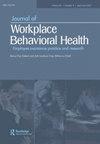儿童福利工作者的自我照顾活动及其对健康和福祉的影响
IF 0.8
Q3 PUBLIC, ENVIRONMENTAL & OCCUPATIONAL HEALTH
引用次数: 0
摘要
摘要儿童福利工作者在工作中存在着严重的身心健康问题。虽然社会服务专业人员的自我照顾经常受到鼓励,但直到最近学者们才开始研究儿童福利工作者的自我照顾行为。尽管有大量关于自我照顾在减少压力和倦怠方面的积极影响的研究,但对儿童福利工作者的有限研究表明,自我照顾实践的参与程度并不高。本研究采用封闭式和开放式问卷调查的方式,探讨了佛罗里达州儿童福利工作者(n = 1006)自我照顾活动的类型和频率,以及这些活动对工作者健康和福祉的影响,包括倦怠、二次创伤压力、工作满意度和工作与生活平衡的测量。员工对开放式调查问题的回答分析了身体、情感和精神自我保健领域的主题。卡方检验确定了经常从事自我保健活动的员工在身体和情绪健康评分上的差异。线性回归结果显示,身体和情感自我保健实践与员工的幸福感相关。儿童福利工作者对自我照顾活动的压倒性参与及其对他们的健康和福祉的影响表明,对工作场所的自我照顾和福祉采取有组织的办法十分重要。关键词:儿童福利工作人员自我护理健康与幸福倦怠工作与生活平衡工作满意度披露声明作者未报告潜在的利益冲突。本研究由佛罗里达儿童福利研究所资助(项目编号037181)。本文章由计算机程序翻译,如有差异,请以英文原文为准。
Child welfare workers’ self-care activities and impacts on health and well-being
AbstractChild welfare workers experience high levels of emotional and physical health problems stemming from their work. Though self-care among social services professionals is often encouraged, only recently have scholars begun to examine the self-care behaviors of child welfare workers. Despite plentiful research on the positive impact of self-care in reducing stress and burnout, limited research with child welfare workers shows only modest engagement in self-care practices. The present study used closed and open-ended survey responses to explore the type and frequency of self-care activities of a cohort of child welfare workers in Florida (n = 1006), and the impact of those activities on workers’ health and well-being, to include measures of burnout, secondary traumatic stress, job satisfaction, and work-life balance. Workers’ responses to open-ended survey questions were analyzed for themes across physical, emotional, and spiritual self-care domains. Chi-square tests determined differences in physical and emotional health ratings for workers who regularly engaged in self-care practices. Linear regression results showed that physical and motional self-care practices were associated with workers’ well-being. The overwhelming participation in self-care activities among child welfare workers and their impact on their health and well-being suggests the importance of an organizational approach to self-care and well-being in the workplace.Keywords: Child welfare workforceself-carehealth and well-beingburnoutwork-life balancejob satisfaction Disclosure statementNo potential conflict of interest was reported by the author(s).Additional informationFundingThis work was supported by The Florida Institute of Child Welfare (Project #037181).
求助全文
通过发布文献求助,成功后即可免费获取论文全文。
去求助
来源期刊

Journal of Workplace Behavioral Health
PUBLIC, ENVIRONMENTAL & OCCUPATIONAL HEALTH-
CiteScore
2.40
自引率
6.70%
发文量
14
期刊介绍:
The Journal of Workplace Behavioral Health, retitled from Employee Assistance Quarterly to better reflect its expanded focus, presents innovative research, applied theory, and practical information to keep workplace human service administrators, counselors, and consultants up to date on the latest developments in the field. This refereed journal is an essential guide to best practice and research issues faced by EAP professionals who deal with work-related and personal issues including workplace and family wellness, employee benefits, and organizational development.
 求助内容:
求助内容: 应助结果提醒方式:
应助结果提醒方式:


